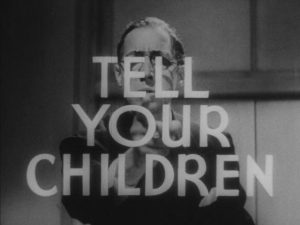
“The Motion Picture you are about to witness may startle you. It would not have been possible, otherwise, to sufficiently emphasize the frightful toll of the new drug menace which is destroying the youth of America in alarmingly increasing numbers. ^ Marihuana is that drug. A violent narcotic — an unspeakable scourge — The Real Public Enemy Number One! ^ Its first effect is sudden, violent, uncontrollable laughter; then come dangerous hallucinations — space expands — time slows down, almost stands still… fixed ideas come next, conjuring up monstrous extravagances, the total inability to direct thoughts, the loss of all power to resist physical emotions… leading finally to acts of shocking violence… ending in often incurable insanity. ^ In picturing its soul-destroying effects, no attempt was made to equivocate. The scenes and incidents, which are fictionalized [here], are based upon actual research into the results of Marihuana addiction. ^ If their stark reality will make you think, will make you aware that something must be done to wipe out this ghastly menace, then this picture will not have failed in its purpose. Because the dread Marihuana may be reaching forth for your son or daughter… or yours…OR YOURS!” ^ -Opening Crawl for “Reefer Madness” (1936)
God almighty, and I thought I could be long-winded at times… ^ With a film like “Reefer Madness,” any real analysis seems impossible. For its dated, campy qualities alone, the picture is so embedded in its own panicky bunk as to be unreadable. Or maybe not.
Subtitled “Tell Your Children”–a grave warning similar to Kevin McCarthy’s at the end of “Invasion of The Body Snatchers”–“Reefer Madness” is clearly meant as education (mostly for parents) against their kids involvement with pot. This, we can only conclude, as opposed to them getting plastered on bathtub gin. Yet for its time, we may recognize “Reefer Madness” as a limited, freaky cousin of messages found in “Requiem for a Dream” and “Traffic” warning us as much to just say no.
The film (grafted to DVD from a badly damaged print) begins and ends with the same narrator: a white male authority figure–probably born during the Civil War–lecturing a local PTA meeting on the drug menace. He then goes on, in a muddled flashback that is “Reefer Madness,” to relate the tragic story of Bill — an All-American teen seduced by the nightmare of marijuana. Thus, though Bill’s example, the big, scary message of “Reefer Madness” is made simple: smoke pot, and; a) turn into a criminal; b) turn up dead; or worst of all, c) lose one’s virginity (before marriage) in a wild, drug-induced tango of humping and twisted sweaters.
Yet past its goofy doomsaying, the logic behind “Reefer Madness” is best described in filmmaker Ron Mann’s 2000 documentary “Grass,” which mocks the U.S. government’s anti-pot crusade following the repeal of Prohibition in 1933, just three years before “Reefer Madness” was released. In his film, Mann argues that after booze returned to social acceptance, America’s temperance movement needed–and got–a new public enemy in marijuana, which it battles today with (arguably) as little success.
As pure camp, “Reefer Madness” is only half-successful. Yes, there are scenes that are hilariously over-the-top — including an oldster run down by a baked teenager — but little else to sustain us for 67 minutes. Instead, the film is more interesting as a video time capsule reflecting what some saw as a threat to America’s moral fiber.
Who was it that said: “The more things change, the more they stay the same?”
Oh, never mind.



That movie was so stupid that it actually made sense to me (maybe it was the pot talking).